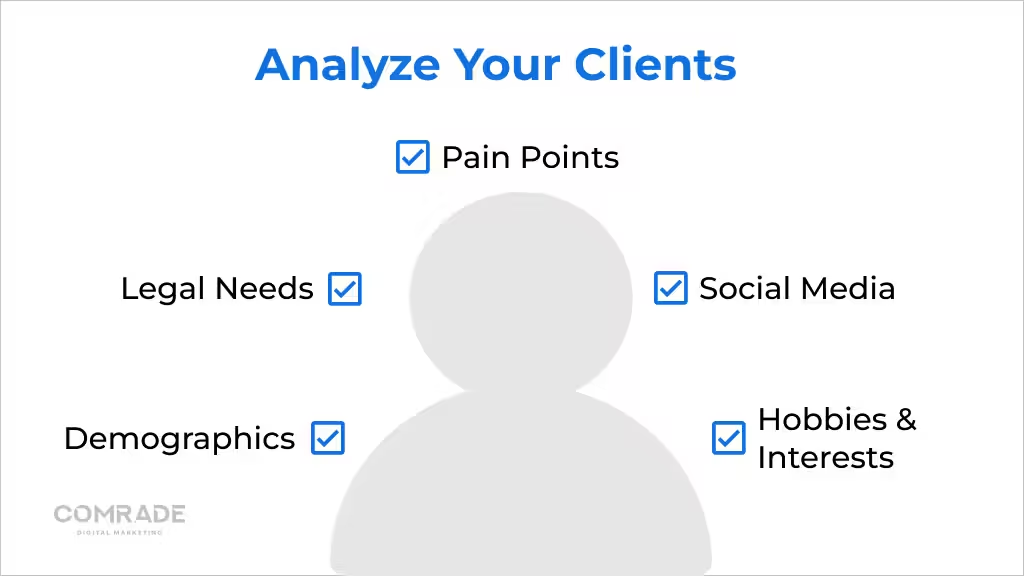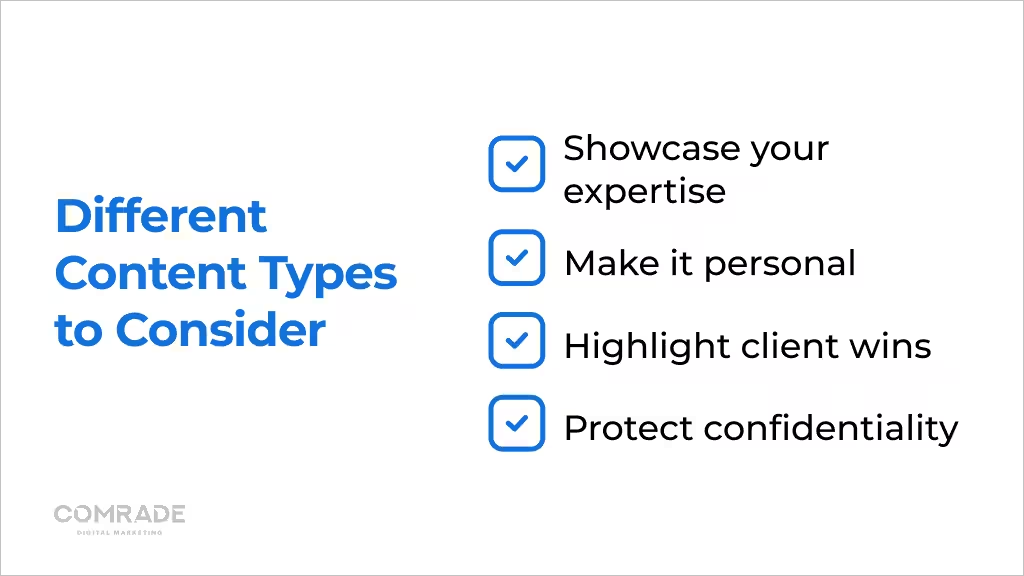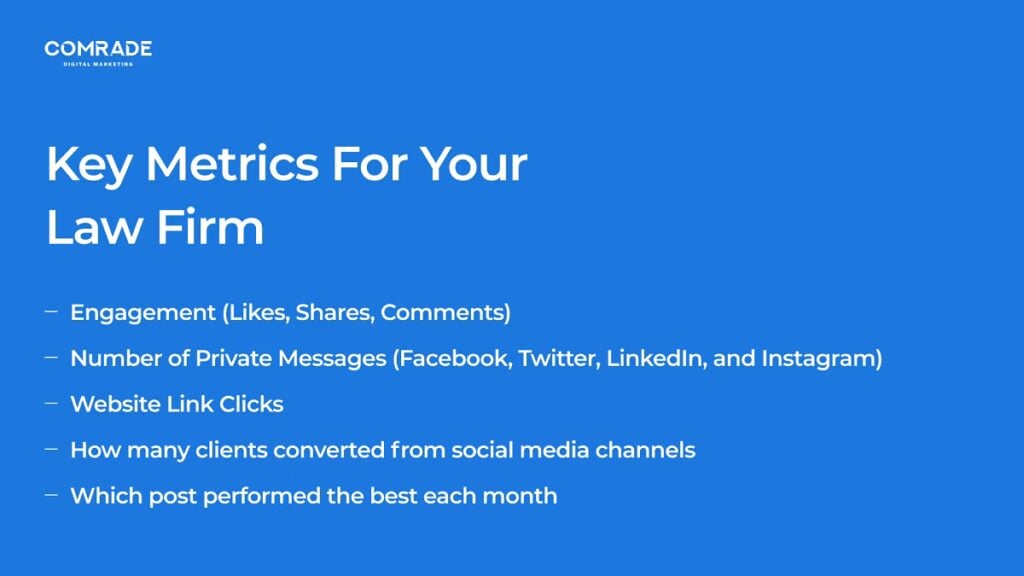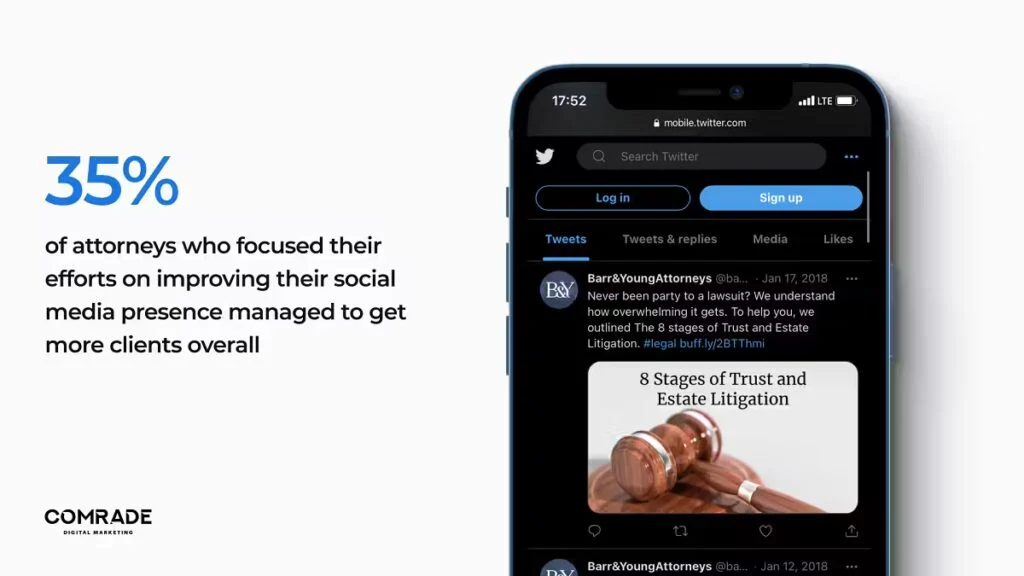You’re an excellent lawyer, but right now, you’re in a slump, relying on referrals and dealing with inconsistent revenue.
How can you attract legal clients more effectively?
One essential tool is social media marketing, with research proving that 84% of law firms attract high-quality leads on social media. Your potential clients are scrolling through Facebook, LinkedIn, TikTok, and Instagram, and if your firm isn’t showing up, they’re finding your competitors instead.
We’ve outlined 8 strategies to help you choose the best social media channel and effectively connect with high-quality prospects for your law firm.

8 Social Media Marketing Strategies for Law Firms in 2025
1. Pick the Right Platform
Not all social media platforms for lawyers are created equal—especially when it comes to attracting quality leads through legal social media marketing. The key isn’t just “being on social media”. It’s about being in the right place where your ideal clients are already looking for legal help.
So, where should you focus your efforts? It all depends on your practice area and content preference.
If you’re a divorce or personal injury attorney, your clients are everyday people—which makes social media marketing on Facebook and Instagram your best bet for building trust and attracting leads. On the other hand, if you work with small businesses in areas like corporate or employment law, using LinkedIn for your law firm is ideal.
Here’s how different platforms align with specific content types:
- Facebook has over 2.11 billion daily users, making it ideal to reach everyday users. Use it to share client success stories and legal tips, and run targeted ads that bring in high-quality leads.
- Instagram is perfect for building trust through behind-the-scenes content and quick legal insights. And with a median engagement rate of 2% across all industries, it’s significantly higher than Twitter’s 0.1%.
- LinkedIn is your goldmine if you work with business clients. With 57% of law firms already on LinkedIn, it’s perfect to establish authority, network with professionals, and position yourself as the go-to legal expert.
- YouTube is a great platform to build authority with subject matter breakdowns. According to marketing industry influencer Krista Neher, the human brain can process visuals up to 60,000 times faster than words. That means you can convey the same message in a 30-second video as you can in a 30-page e-book.
Comrade’s Key Takeaway
We’ve seen firsthand how powerful YouTube can be for lawyers. As the second-largest search engine after Google, it provides long-term discoverability. A well-optimized video on topics like ‘What to do after a car accident’ can rank for months—or even years—continuously bringing in new potential clients.
- TikTok is a hidden gem for lawyers willing to simplify legal concepts in short, engaging videos. Answer FAQs and bust legal myths to build brand recognition.
And remember, your clients are not searching for legal jargon—they want real solutions to their problems, so be the attorney who shows up, educates, and builds trust.
Unlock the power of digital marketing for law firms and watch your practice grow – dive into our latest post!
2. Identify Your Ideal Clients
Social media isn’t about shouting into the void—it’s about speaking directly to the right people.
As a law firm, it’s so important to define your target audience. Getting the right message in front of the right people at the right time is how you attract high-quality clients. Based on our extensive marketing experience, we suggest three things:
- Understand your client demographics and legal needs
- Create buyer personas for effective messaging
- Use social media analytics to refine audience targeting
Discover the power of PPC marketing for lawyers and unlock the potential to reach your ideal audience.
Remember, your best clients aren’t random—they have common traits, challenges, and legal needs. Start by analyzing your past and current clients. Look for patterns in:

- Demographics: Age, location, income, and job type.
- Legal Needs: What problems are they trying to solve? What legal questions are they searching for online?
- Pain Points: What’s keeping them up at night? What questions do they have?
- Social Media: Where do they spend their time online? Are they active on Facebook groups, scrolling Instagram, networking on LinkedIn, or consuming short-form content on TikTok?
- Hobbies & Interests: What activities or communities do they engage with? Do they follow business influencers, personal finance pages, or legal education content?
Once you pinpoint these details, you can build a buyer persona, which is a clear profile of the clients you want to attract.
Grow your practice and unlock the power of SEO for lawyers with a legal marketing agency.
3. Choose a Content Strategy for Your Law Firm
Posting randomly won’t cut it. To craft content that truly resonates with your audience’s needs, pain points, and interests, you must plan ahead and post actively.
Comrade’s Key Takeaway
AI-driven search models increasingly consider social media activity — maintaining an active presence helps greatly with visibility.
We recommend creating a content calendar that covers how many posts you create per week and what types of content you use. Here are some ideas to incorporate into your overall content strategy:
- Plan Ahead with a Content Calendar – Schedule posts weekly to stay consistent and cover a mix of legal tips, client success stories, and industry updates.
- Tailor Content to Each Platform – Use Facebook and LinkedIn for in-depth insights, Instagram and Twitter (X) for visuals, and YouTube and TikTok for engaging videos.
- Speak Your Client’s Language – Avoid legal jargon, focus on real concerns, and maintain a professional yet approachable tone.
- Use Engaging Visuals – Branded graphics, infographics, and behind-the-scenes images help capture attention and build trust.
- Track and Adjust Based on Performance – Analyze engagement metrics to refine your strategy and focus on content that generates the most leads.
ABA’s 2018 Survey reported that 35% of professionals who use social media regularly gained new clients, so stay consistent and stay visible.
When you post consistently, engage meaningfully, and provide value, clients will remember your name when they need legal help.
4. Try New Content Styles and See What Sticks
How do you find what resonates best with your audience? To effectively use social media marketing for law firms, it’s crucial to experiment with different types of content.
Lawyers who experiment, analyze, and refine their content don’t just attract attention—they attract the right clients. Here are different content types to consider:

- Showcase Your Expertise – Share in-depth articles, thought leadership insights, and legal tips to position yourself as a subject matter expert.
- Make It Personal – Give people a behind-the-scenes look at your firm. Whether it’s a team celebration, a day in the office, or community involvement, authenticity builds connection.
- Highlight Client Wins – (With permission) Share success stories that demonstrate how your firm delivers results. Real cases build real confidence.
- Protect Confidentiality – Privacy is a priority, but don’t shy away from educating and sharing your values. Transparency strengthens credibility.
Remember, not all clients consume content the same way. Some prefer in-depth articles, while others prefer live Q&As or videos— so be sure to mix it up. And speaking of videos, seeing as only 30% of law firms use video marketing—there’s plenty of room to dominate here. The key to effective social media marketing is testing different formats, styles, and topics until you find what truly drives engagement, builds trust, and brings in leads to your law firm.
Want long-term growth for your firm? See how content marketing for lawyers builds credibility and cases.
5. Make Social Media an Extension of Your Marketing
Your law firm social media strategy shouldn’t exist in a vacuum—it should be a powerful extension of your overall law firm marketing approach and digital presence.
Comrade’s Key Takeaway
While social media is not the primary driver of client acquisition for most law firms, it plays a crucial supporting role in a firm’s overall digital marketing strategy.
A regularly updated social presence signals credibility and trustworthiness to potential clients, even if they discover the firm through other channels like SEO or paid search.
Our recommendation is to think bigger and consider your ideal client’s overall journey.
For example, if you’re hosting an educational seminar on Zoom, here’s a quick plan on how you can use social media to promote it:
- Announce Early – Post a teaser about the event date and topic to build anticipation.
- Create an Event Page – Use Facebook or LinkedIn to manage RSVPs and share details.
- Post Speaker Spotlights – Highlight featured guests or experts to build credibility.
- Go Live – Do a short live Q&A or behind-the-scenes prep to boost interest.
- Run a Countdown – Remind followers with “1 week to go” and “Last chance to register” posts.
- Follow Up After – Share key takeaways, photos, and attendee testimonials to extend engagement.
The above is an excellent example of using social media to support your larger marketing initiatives.
Also, keep in mind that social media also plays a crucial role in search engine optimization for law firms. It helps attorneys increase their visibility on Google and turn casual followers into actual leads—by guiding them to your email list, landing pages, or consultations where real conversions happen.
Don’t let your social media efforts work in isolation. Integrate them with your full marketing strategy to maximize your reach, credibility, and client acquisition.
6. Keep Your Law Firm’s Brand Consistent
To create a strong brand, consistency is key.
Think about the most recognizable brands in the world—Nike, Apple, Coca-Cola. What makes them stand out? It’s not just their logo or colors—it’s their consistency. Every ad, social media post, and customer interaction reinforces who they are.
The same principle applies to your law firm.
Your colors, fonts, messaging, and tone should align across all platforms so that clients instantly recognize you. Whether someone finds you through a Google search, a Facebook ad, or a referral, they should get the same professional, reliable impression of your firm every time.
Here’s what we recommend:
- Start by customizing your profiles – Use professional headshots, a well-crafted bio, and relevant contact information.
- Stay on brand – Before you hit “post”, ask yourself: Does this align with my firm’s brand? Is the tone consistent? Does the message reinforce the trust and authority I want to project?
- Post valuable legal insights – Consider sharing industry updates and thought leadership content that resonates with your target audience.
- Engage with followers – Make sure to respond promptly to comments, messages, and inquiries, demonstrating your commitment to client service.
When you stay consistent, you don’t just attract clients—you build a brand that they remember and respect.
Ready to elevate your law firm’s marketing strategy? Explore our expert tips and strategies in our latest article.
7. Build Trust and Boost Your Law Firm’s Social Media Credibility
Without trust, your law firm won’t have much of a reputation. So how do you go about boosting your credibility as a lawyer on social media?
Comrade’s Key Takeaway
Providing general legal guidance, addressing common concerns, and offering emotional support through social media content can build trust.
Here are three key strategies to achieve this:
- Showcase Your Expertise – Share valuable insights, simplify legal issues, and answer common questions through posts, articles, and videos. Clients trust lawyers who educate them.
- Engage with Your Audience – Join legal discussions, answer questions, and collaborate with industry influencers to expand your reach and credibility.
- Leverage Client Reviews – Encourage happy clients to leave testimonials and respond professionally to comments to strengthen your reputation.
- Humanize Your Firm – Use Facebook Live, Instagram Stories, or LinkedIn videos to introduce your team, share behind-the-scenes moments, and highlight client success stories.
By implementing these social media strategies, lawyers can not only attract clients, but also build a brand that people trust, and make their law firm the obvious choice.
Don’t miss out on the ultimate resource for law firm growth in 2025. Dive into our guide and take your practice to the next level.
8. Interpret and Analyze Your Results
If you’re not tracking your social media marketing for law firms performance metrics, you’re leaving potential legal clients—and revenue—on the table.
What’s working? What’s not? The only way to know is through consistent analysis and optimization.
Identify the key metrics that matter for your firm—lead generation, engagement, website clicks, and client inquiries. Track them monthly and use the data to refine your strategy.

A few common metrics to evaluate include:
- Engagement (Likes, Shares, Comments)
- Number of private messages (Facebook, Twitter, LinkedIn, and Instagram)
- Website link clicks
- Number of net new followers (new followers minus unfollows)
- How many clients converted from social media channels
- Which post performed the best each month
For example, using the metrics above, you can track a Facebook Ad to determine how many people visited a specific website landing page. Then, set a goal to see how many visitors came to your Thank You page after filling out your form.
Digital marketing analytics tools such as Google Analytics give you the ability to determine the traffic source for these prospects. Additionally, you can integrate call tracking software into Google Analytics. This allows you to track prospects from Facebook to their first call to your office.
By understanding these numbers, you can determine the effectiveness of your social media efforts.
Benefits of Professional Social Media Marketing for Law Firms
As you just saw, social media is one of the most powerful tools for attracting new clients and growing your law firm.
It increases visibility, builds trust, and keeps you top of mind when legal help is needed. Here are just the top 3 benefits:
1. Social Media Gets You More Clients
Law firms that use social media well don’t just get likes—they get real clients and steady revenue. In fact, the American Bar Association found that 35% of attorneys who focused their efforts on improving their social media presence grew their client base significantly.

2. Engaged Prospects Turn Into Eager Clients
People don’t just scroll through social media for fun—they’re looking for answers, solutions, and experts they can trust. If your law firm is simply posting content without engaging, you’re missing the point.
Stay active and engaged on social media. The more you connect, the more you become the firm people turn to when they need legal help.
3. Social Media Drastically Improves Your SEO
Think social media is just for engagement? Think again!
The more active and credible your law firm marketing appears across social media platforms for lawyers, the better your chances of ranking higher in search results.
Google now pulls social media activity into its search results, meaning your latest posts, client testimonials, and legal insights could be front and center when someone searches for a lawyer.
An optimized social media presence isn’t just about branding—it’s a powerful tool to increase your visibility on Google and drive more potential clients to your firm.
Stay ahead of the competition with cutting-edge law firm SEO services – read our expert insights today!

Important: Lawyer Social Media Ethical Considerations
When diving into social media management for law firms, remember: with great visibility comes great responsibility.
One misstep could put your credibility—or even your license—on the line. Maintaining professionalism, protecting client confidentiality, and following legal advertising rules aren’t optional; they’re essential.
So, before you post, engage, or advertise, keep these key ethical considerations in mind:
- Confidentiality and privilege: Protect client confidentiality; avoid sharing info that breaches it. Don’t disclose case or client details without authorization.
- Advertising rules: Comply with social media advertising rules. Provide accurate info about your firm; avoid false or misleading statements.
- Avoid conflict of interest: Be mindful of connections, affiliations, or endorsements that create conflicts.
- Maintain professionalism: Avoid heated debates and offensive remarks. Maintain respect and courtesy in interactions.
By being mindful of these ethical considerations, your law firm can effectively navigate social media marketing while upholding its professional responsibilities.
This ultimately saves you money by avoiding unnecessary complications or disciplinary actions.
Not sure where to start? Comrade Digital Marketing Agency can help you get started with SEO. Schedule a free consultation.
Turn Social Media Into Your Firm’s Most Powerful Growth Tool
Successful law firms aren’t just waiting for referrals—they’re building their brand, engaging with potential clients, and driving steady revenue through social media.
The numbers speak for themselves: 71% of legal professionals polled by Attorney at Work admitted that social media was responsible for bringing in new clients.
Right now, people are searching for legal help. The real question is: will they find you or your competitor? With the right strategy, social media isn’t just a marketing tool—it’s a client-generating powerhouse.
Our final recommendation? Stay consistent and provide value, and you’ll successfully turn your law firm’s online presence into a steady stream of new business.
If you need help marketing your law firm through social media, SEO, and PPC, contact Comrade Digital Marketing today at (872) 242-1074 or schedule a free consultation.
